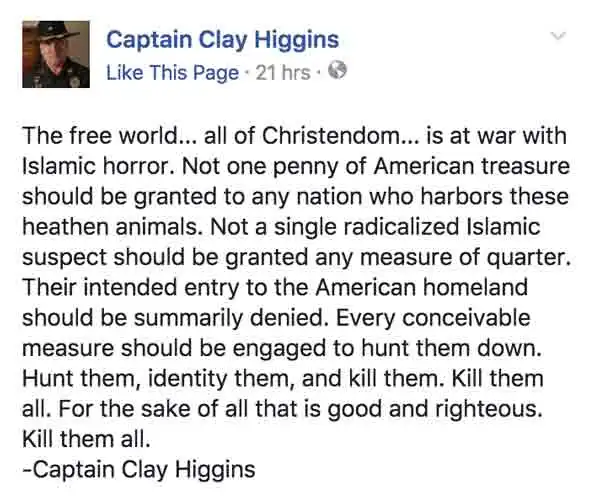In June 2017, Representative Clay Higgins, a Republican congressman from Louisiana, ignited a firestorm of controversy with a provocative and deeply disturbing Facebook post calling for the killing of “radicalized” Islamic terrorists. The post, which followed the deadly terror attacks in London that left seven people dead and nearly 50 injured, has drawn significant backlash and raised questions about the appropriate rhetoric and actions in the face of global terrorism.
The Post and Its Content
Higgins, known as the “Cajun John Wayne” for his tough-talking style, did not mince words in his post. He stated,
“The free world… all of Christendom… is at war with Islamic horror. Not one penny of American treasure should be granted to any nation who harbors these heathen animals. Every conceivable measure should be engaged to hunt them down. Hunt them, identify them, and kill them. Kill them all.”

This incendiary message, which essentially called for the extrajudicial killing of individuals based on their suspected affiliation with terrorism, quickly garnered widespread attention and criticism. Many saw it as not only irresponsible but horrifying, a blatant call to violence that disregarded the rule of law and basic human rights. The post evoked images of vigilante justice and mass violence, raising alarms about its potential to incite real-world harm.
Reactions and Backlash
The backlash was swift and intense. Critics, including advocacy groups and fellow politicians, condemned Higgins’ remarks as dangerous and counterproductive. The Council on American-Islamic Relations (CAIR) issued a statement urging leaders to reject such inflammatory rhetoric, warning that it could incite violence against innocent Muslims and further alienate communities.
Corey Saylor, a spokesperson for CAIR, remarked, “This is the kind of rhetoric that leads to hate crimes and makes communities feel unsafe. Our leaders should strive to unite us, not divide us with fear and hatred.” Saylor’s comments underscore the potential real-world consequences of Higgins’ horrifying call to arms.
The United States has seen a troubling increase in hate crimes against Muslims. According to the FBI, hate crimes against Muslims surged by 67% in 2015 compared to the previous year. In 2016, the trend continued, with 307 incidents of anti-Muslim hate crimes reported, including assaults, vandalism, and threats. This alarming rise in anti-Muslim sentiment highlights the dangerous impact of incendiary rhetoric like that used by Higgins.
Religious Hypocrisy
Adding another layer to the controversy, Higgins often presents himself as a devout Christian, claiming to be guided by his faith in his public and private life. However, his call for mass violence starkly contrasts with the teachings of Christianity, which emphasize love, forgiveness, and compassion. Jesus Christ, the central figure of Christianity, taught his followers to love their enemies and turn the other cheek, a far cry from Higgins’ exhortation to “kill them all.”
This glaring inconsistency has led many to question Higgins’ sincerity and integrity as a man of faith. Critics argue that his comments reveal a vile hypocrisy, betraying the core principles of the religion he professes to follow. Instead of promoting peace and understanding, Higgins’ rhetoric fuels division and hatred, tarnishing the values he claims to uphold.
Political and Public Reactions
Higgins’ comments also drew criticism from within his own party. Some Republicans distanced themselves from the remarks, emphasizing that while the fight against terrorism is crucial, it must be conducted in a manner consistent with American values and respect for human rights. The starkness of Higgins’ language, calling for indiscriminate killing, was seen as crossing a moral and ethical line.
Despite the criticism, Higgins’ post found support among certain segments of the population. Supporters argued that his blunt approach was a refreshing change from what they perceived as politically correct and overly cautious rhetoric. They contended that Higgins was simply voicing the frustrations of many Americans who feel that not enough is being done to combat terrorism.
Higgins defended his post, stating that his words were directed specifically at terrorists, not all Muslims. He insisted that his comments were a reflection of his deep frustration and commitment to protecting American lives. However, this defense did little to alleviate the horror many felt at his call for broad and violent measures.
The Broader Implications
The controversy surrounding Higgins’ post highlights the broader debate over how best to address the threat of terrorism without alienating or demonizing entire communities. It underscores the fine line that public officials must walk between expressing legitimate security concerns and engaging in rhetoric that can be perceived as hate speech.
In an era where social media posts by public officials can reach millions instantly, the responsibility to communicate thoughtfully and responsibly has never been greater. The incident serves as a reminder of the power of words and the potential consequences of inflammatory language. Higgins’ horrifying call for mass violence risks inciting exactly the kind of fear and division that terrorists seek to create.
Rep. Clay Higgins’ controversial and horrifying Facebook post in June 2017 serves as a stark example of the tensions and challenges in addressing global terrorism. While his call to action resonated with some, it highlighted the risks of divisive rhetoric and the importance of thoughtful discourse in public life. As the world continues to grapple with the threat of terrorism, the need for leaders who can navigate these complex issues with wisdom and sensitivity is more crucial than ever. Higgins’ words, far from being a solution, underscore the dangers of responding to violence with further violence. Additionally, his hypocritical stance as a self-proclaimed man of God reveals a troubling disconnect between his professed values and his actions, further tarnishing his credibility and integrity.
